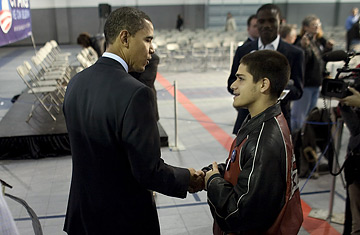
Democratic presidential hopeful Sen. Barack Obama greets a young supporter in Monticello, Iowa.
Barack Obama's Iowa campaign often looks like it's all about the youth vote. The senator's rallies on college campuses draw big, enthusiastic crowds. His campaign gear — understated silk-screened silhouettes on "ringer" t-shirts — is by far the coolest on the trail. So intense is the magnetism between Obama and undergrads that David Yepsen, venerable political columnist of the Des Moines Register, wrote a half-serious piece in which he worried that out-of-state students at Iowa colleges might flood Thursday's caucuses, swept away by Obamamania.
But Obama is surely too smart to rely on first-time voters to put him over the top. You don't go from the Illinois state legislature to the front ranks of presidential politics in four years by chasing phantoms. And the dream of a surging youth vote is nowhere more phantasmagorical than in square old Iowa.
To begin with, the youngest demographic — voters 18 to 24 — is by far the hardest slice of the electorate to organize and deliver. Ask Howard Dean. In 2003, his surging Democratic campaign captured the imaginations of young liberal voters, many of whom donned orange hats to go doorbelling for Dean through Iowa neighborhoods. Come voting time, the under-25 crowd cast an estimated 3.9% of the ballots. In other words, they vanished.
That should have been no surprise. From state to state and election to election, under-25 turnout lags its elders by 20 to 30% — a number surprisingly consistent no matter who's running for President or how they campaign.
A hard job becomes even harder in Iowa because the state has relatively few young people to court. According to Census data, Iowa has the 13th highest median age in the country.
And then there's the fact that Iowa chooses candidates by caucusing. Caucus voting is no simple matter of visiting a polling station at a convenient moment during the day. You have to show up one evening at a neighborhood home or some local meeting room. (One Des Moines area caucus is often held in the lobby of a Christian radio station.) You have to declare your preference publicly and hold to it as people try to persuade you that you're wrong. For first-time voters, it can be intimidating to walk into a roomful of strangers who seem to know one another (and one another's children and tea ball recipes) and to figure out exactly what's going on.
Few people of any age like to caucus; turnout in 2004 was unusually robust for the Iowa caucuses and still less than one in 10 citizens of voting age turned out. And low turnout isn't a bug in the caucus machinery — it's a key feature. The caucus is designed to keep people away.
The Obama campaign is well aware of all this. Some of them are veterans of the Dean campaign, after all. My colleague Michael Grunwald asked an Obama official not long ago if they were really counting on the student vote. "Oh no," he answered. "I saw that movie in 2004."
So if Obama is not banking on a transformation of youthful enthusiasm into reliability on caucus night, why make it look like that's the plan?
Nostalgia may have a lot to do with it.
There will almost certainly be more people 68 to 74 caucusing on Thursday than those 18 to 24. But those old folks were young once, and if they were Democrats, they were swept up half a century ago in the youth-oriented campaign of John F. Kennedy. An even larger number will undoubtedly come from the 58 to 64 demographic, with their fond memories of political engagement on college campuses in the late 1960s and early '70s.
A candidate who seems to fire the hearts of today's young people will find a warm welcome in the collective memory of older Democrats. And beyond nostalgia, there are key constituencies in the Democratic party that are temperamentally attuned to the idea of organizing on campus: school teachers, college professors, Hollywood (which markets primarily to the young) and philosophical small-D democrats who favor greater participation of all kinds.
Barack Obama will be happy to have all the student turnout he can get. But the prize is not the votes, but the brand. The image of the new and charismatic candidate is a powerful marketing tool for a would-be Democratic candidate. Campaign young — but organize gray: that's the real winning strategy.
